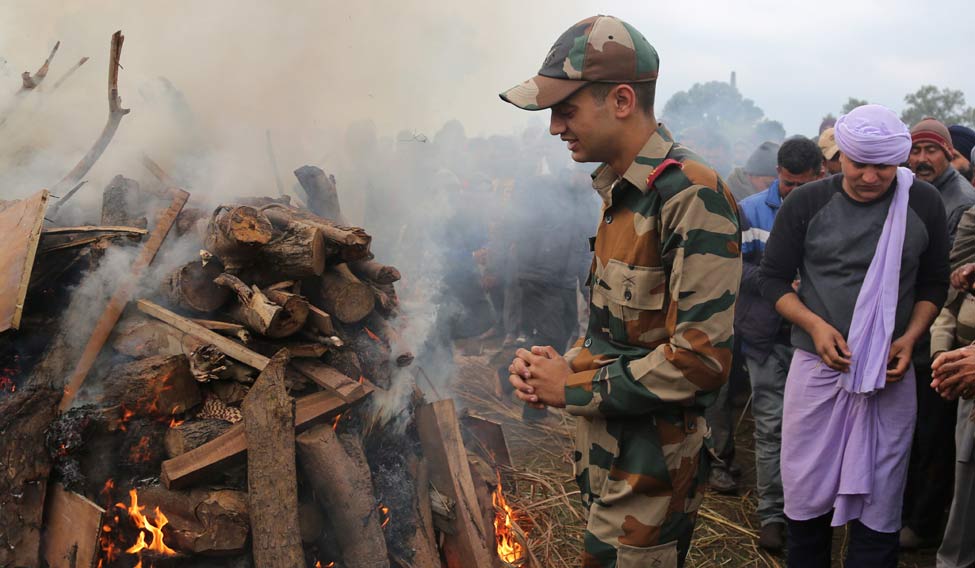Pakistan-based Jaish-e-Muhammad militants who attacked the Sunjwan Army camp in Jammu on February 10 could be members of a large group that infiltrated into Kashmir last year.
The 20-member group, all fidayeen (suicide attackers), had succeeded in infiltrating into Kashmir last summer through Poonch in Jammu.
The group was received by Jaish's slain commander Noor Muhammad Trali, a four-footer resident of Daarganai Gund at Tral in Pulwama.
Trali, 46, was on parole when he reactivated Jaish in Kashmir in 2016. When police became suspicious of his activities he went underground.
According to sources, Trali helped the large Jaish group move to south Kashmir's Pulwama, Shopian, Kulgam and Tral. He also arranged local support for the fidayeen to familiarise them with different areas and also helped them identity different targets.
The Jaish fidayeen have maintained a low profile in Kashmir and have avoided taking to social media like Hizbul Mujahideen.
Sources in south Kashmir said the Jaish militants behave extremely well with the locals, especially, those who provide them shelter and food.
''They pay for the food and when they leave they seek forgiveness for having stayed over,'' sources in south Kashmir told THE WEEK.
The Jaish fidayeen are said to be closer to men working with former Hizbul commander Zakir Musa who is leading the purported Kashmir chapter of Al Qaeda, Ansar Gazhwat-ul-Hind.
After infiltrating into Poonch, the 20 member-fidayeen traveled to south Kashmir and split into smaller groups of two to three members. Most of the Jaish fidayeen are well trained and have well armed.
Jaish has exploited the execution of Afzal Guru, who was hanged secretly in Tihar on February 9, 2013, for his role in Parliament attack, to justify its attacks on security camps across Jammu and Kashmir.
Though Guru had joined pro-independence and secular JKLF in the 90s and later surrendered to pursue a normal life, Jaish has owned him after he was accused of having aided Jaish fidayeen who attacked Parliament in 2001.
Police sources said the accusation that Guru aided Parliament attackers has come as a handy alibi for the Jaish to use his name to justify their attacks.
Jaish's Afzal Guru Squad has carried out several strikes in Kashmir for the last three-four years.
On a couple of occasions, the security forces found Afzal Guru Squad written on the material used by Jaish militant killed in encounters.
Jaish fidayeen who attacked District Police Line Pulwama on August 27 had also written Afzal Guru on the walls of the building. Four policemen, four CRPF men and three Jaish fidayeen were killed in the firefight.
After Guru's hanging, the security forces maintain high vigil about a possible strike by Jaish on February 9 every year.
This year, too, the intelligence agencies had warned of a possible attack by Jaish to mark the day. Most of the focus was on Kashmir but the Jaish chose Sunjwan Army camp, a relatively soft target because of the residential quarters in the camp
Sunjwan, though well protected, had a few chinks as was proved by the brazen foray by four Jaish fidayeen on February 10, a day after separatist had called for a strike to mark the fifth death anniversary of Guru.
Six soldiers—five of them are from Jammu and Kashmir—were killed in the attack. Nine others including six women and children, a Lt Col and a Major were injured.
The operation dragged for long because the Army first rescued the unarmed soldiers and their families who were trapped in their houses when the fidayeen struck.
Officials of the National Investigation Agency and the state police visited the areas at the back of the Sunjuwan Army camp to investigate how the militants had managed to sneak into the highly fortified Army camp. The camp, which is spread over a radius of nearly 7 km, is surrounded by residential areas.
It was found that boundary wall of the camp is damaged at some spot which has been covered with tin sheets.
The fidayeen seem to have sneaked in from one of the damaged portions of the wall close to a rivulet on the side of the Bhatindi-Sunjwan Road.
The fidayeen seemed to have done a proper recce of the area. The possibility of local support is also being suspected by the police. In 2003, militants had killed more than a dozen soldiers inside the camp.
Informed sources told THE WEEK that the threat of more fidayeen attacks will persist until all Jaish fidayeen who are in the valley are neutralised.
The Jaish has tried to prepare local boys for the same but so far it has not achieved notable success, expect the two boys, Fardeen Khandey, 16, of Tral and Manzoor Baba of Pulwama who attacked the CRPF camp on December 31 at Lethpora on Srinagar-Jammu highway.






